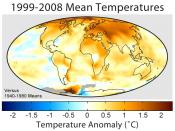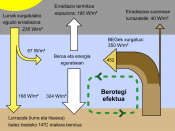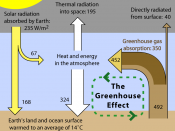The greenhouse effect is "an atmospheric heating phenomenon, caused by short-wave solar radiation being readily transmitted inward through the earth's atmosphere but longer-wavelength heat radiation less readily transmitted outward, owing to its absorption by atmospheric carbon dioxide, water vapor, methane, and other gases; thus, the rising level of carbon dioxide is viewed with concern (n.d. 2008)." This paper will discuss the effects of the greenhouse effect, the global climate change, global warming, and all the factors that contribute to these effects on the earth. This paper will also touch on what the main problems with global warming and how it can't be prevented. After reading this paper the reader will have a better understanding of all these phenomenon's and there effects on nature and humankind. One will able to pinpoint the main the issues, stakeholders and the different perspectives others may have on the situations at hand.
As stated previously the greenhouse effect keeps our planet warm enough to sustain life by trapping heat in the atmosphere to heat the earth.
Without the greenhouse effect there would be no life on earth. Without it the earth's surface would cool down to a temperature of 18 degrees C instead of the temperature of 14 degrees C which is needed to sustain life (Newton, 2006). So one can conclude that the problem is not the greenhouse effect, since the greenhouse effect is needed and already existed prior to human existence, but the fact that the increase of manmade gasses are cause detrimental effects on the atmosphere. The primary gas that is contributed to climate change is Carbon dioxide. The problem is that humans have been adding a vast mount of more Carbon dioxide to the atmosphere from: deforestation, burning charcoal and wood, and the effects of the Industrial Revolution (Newton, 2006).
Global warming: "An increase in the average temperature of the Earth's atmosphere, especially a sustained increase great enough to cause changes in the global climate. The Earth has experienced numerous episodes of global warming through its history, and currently appears to be undergoing such warming. The present warming is generally attributed to an increase in the greenhouse effect, brought about by increased levels of greenhouse gases, largely due to the effects of human industry and agriculture. Expected long-term effects of current global warming are rising sea levels, flooding, melting of polar ice caps and glaciers, fluctuations in temperature and precipitation, more frequent and stronger El Niño's and La Niña's, drought, heat waves, and forest fires. (n.d. 2008)." Two scientists, Dr. Kevin Trenberth of the National Center for Atmospheric Research and Dr. Thomas Karl of the National Atmospheric and Oceanic Administration (NOAA), after the research they have complied came to the conclusion that the changes in the earths atmosphere and the rise of the global temperature was from manmade gasses causing global warming (Newton, 2006). If the rise in temperature continues and global warming is not contained the consequences can be disastrous for the earth and humankind. Flooding, a rise in temperature, sever storms, rising sea levels and droughts are some of the negative effects on the climate if global warming continues. Way of life as everyone knows it would have to change. Some people who live in low lying areas would have to move to high ground due to the rise in sea levels flooding the area. Animal species would be effected also there would be a decline in some species and an increase in others causing an unbalance, which can be detrimental to an ecosystem.
If global warming truly does exist who will it affect? The answer to that question is simple future generations will be affected. So what can one do? Or is there anything one can do to stop global warming? Of course, now the corporations are finding ways to capitalize on the global warming phenomenon with slogans such as: Go Green. What does go green mean? Go green basically is another way of promoting environmentalism. If everybody on the planet that drives a vehicle buys a hybrid vehicle and uses "go green products" would that make a significant difference? One could conclude that yes if one does buy more eco-friendly vehicles and use more environmentally friendly chemicals there would be some change. The corporations that are pushing these products and profiting from them are the ones who are benefiting the most. Because the corporations are not using ethics pertaining to environmental science they are obtaining profit. The only way to stop the greenhouse problem would be to stop all emissions of greenhouse gasses and to use a different source to produce energy. There has already been technology invented that could do so. The electric car could stop the use of fossil fuels in vehicle creating a vehicle with zero emissions. This car has been introduced to the public but was taking of the market because of the oil companies saw a threat of losing profit. Another technology that has potential is the use of hydrogen cell technology. Use hydrogen also has zero emissions and can be used for more then just vehicles; the main problem with this technology is hydrogen is highly flammable and unsafe if not handled properly. So until a feasible idea or the corporations will allow such inventions to be sold to the masses the high emissions will continue to destroy the environment and over time possibly destroy humankind.
ReferencesGlobal warming. (n.d.). The American Heritageî Science Dictionary. Retrieved April 29,2008, from Dictionary.com website: http://dictionary.reference.com/browse/Global warmingGreenhouse effect. (n.d.). Dictionary.com Unabridged (v 1.1). Retrieved April 29, 2008,from Dictionary.com website: http://dictionary.reference.com/browse/Greenhouse effectNewton, Lisa H., Dillingham, Cathrine K., & Choly, Joanne. (2006). Watersheds 4: Of Greenhouses and Freezers. [University of Phoenix Custom Edition e-Text]. , : Thomas Wadsworth. Retrieved April 26, 2008, from University of Phoenix, rEsource, SCI 362 Web site.


